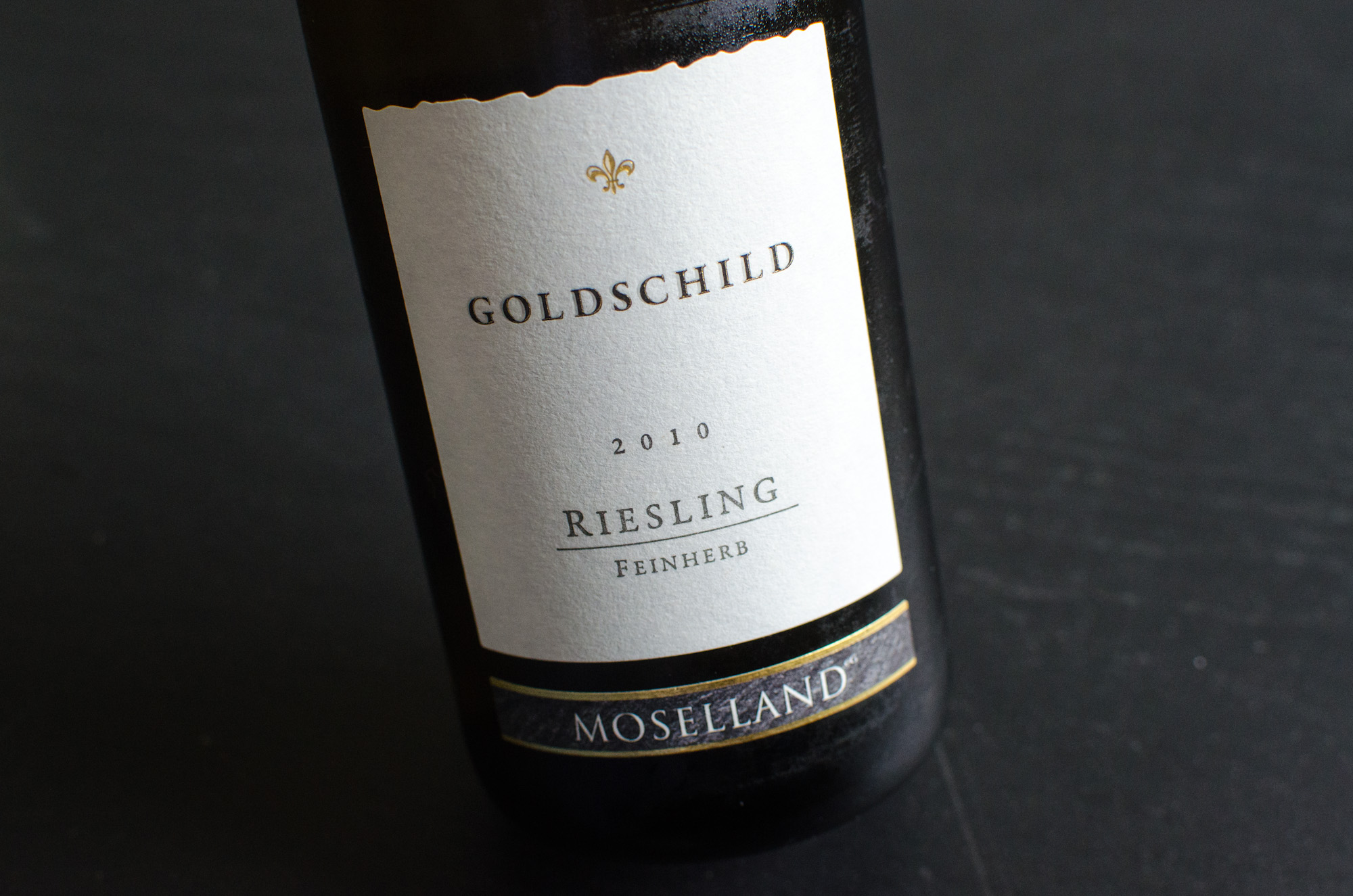Moselland, Riesling feinherb 'Goldschild', 2010
"The law made me do it!" is probably one of the excuses judges don't hear very often. If it comes to German wine, however, it may be more common than you think. The infamous German Wine Law, in combination with the regional wine establishment, is a very odd beast, so much so that you will find top producers who deliberately rate some of their top wines in a fairly low category as they don't quite meet inspectors' expectations. There are all sorts of complaints about the wine law of 1971, but it is still enforced with German precision. So much so that when winemakers wanted to print a new word on labels, "feinherb", they had to go to court as you cannot possibly print something on a label that has not been regulated beforehand.

Well, they succeeded and now we have a new, completely unregulated term in the precisely structured German wine classification: feinherb.
So what does it mean? Basically, it is another word for "halbtrocken", or off/half-dry. Why have another word for a term that customers just about learned to understand? Well, for several reasons. First of all "off-dry" does not sound cool any more in German, especially since the country got infected with the "it has to be dry bug". Secondly, it is not regulated. So whenever you think your wine is not dry any more but also not really sweet you can put it on the label ("halbtrocken" is of course regulated).
Sounds evil and misleading, something the customer cannot rely on? True. It still rocks. You need a little trust in the winemaker, but where that trust is earned you will get delicious wines, especially Rieslings that blend a touch of sweetness and acidity into an addictive mix. Take today's specimen, a bottle that was put into my hands after I attended an event organised by a German tourism board in London. It is made by a growers collective, in fact one of the largest in Germany (and large mean that you can measure the output in many millions of litres). Not quite the small, family owned estate we tend to review here. And still a wine that went down like a treat.
A nose of citrus, honey dew melon, herb and a little chalk. Pleasant, not overly intense on the first night but with more richness, especially honey, coming out on the second day. On the tongue the Riesling is light and juicy, glides down the tongue on soft caramel sweetness. Not a wine that dazzles you with deep complexity or unusual aromas. Not a wine to put away for a decade. A wine to get out now (although I am sure it will do okay for a few years), to drink, to enjoy. Feinherb - cheers!

Comments
I work as a 'Weinberater' in
I work as a 'Weinberater' in a slightly upmarket supermarket in Germany, we have a few wines from Moselland in our range. At a tasting of their wines at our head office, I came across one called 'Insignum' which was from the Erdener Treppchen, priced at a tiny 10€, its easily the best German wine in our range when comparing price with quality although it comes delivered in a hideous wooden box with a candle. It is of course 'Feinherb' too - I find a much better term for describing wines with a decent level of residual sugar, if I say Halbtrocken, I'm ignored.
Nevertheless, Mosselland is certainly one of the better (if not larger) producers when you think about generic wineries for a region, compared to Badische Winzerkeller, Moselland is a proper treat!
In reply to I work as a 'Weinberater' in by Lee Markham
Moselland
Thank you for your comment, Lee. Moselland have made a few more interesting design choices and I may review an oddly shaped bottle of a half-dry red wine later this year, so it is not just your candle box (why a candle, one wonders). I haven't had much experience of Moselland wines at all, although I have been aware of them for a while. They don't seem to export to the UK, or at least not to the merchants and supermarkets I frequent, and when in Germany I usually look for wines from smaller producers as on these rare visits I want something more special, if that makes sense.
It is encouraging to hear that this is not the only enjoyable (and one would hope reasonably priced) wine they do, it gives me more confidence to tackle the off-dry red, which, I admit it, I so far have been scared of.